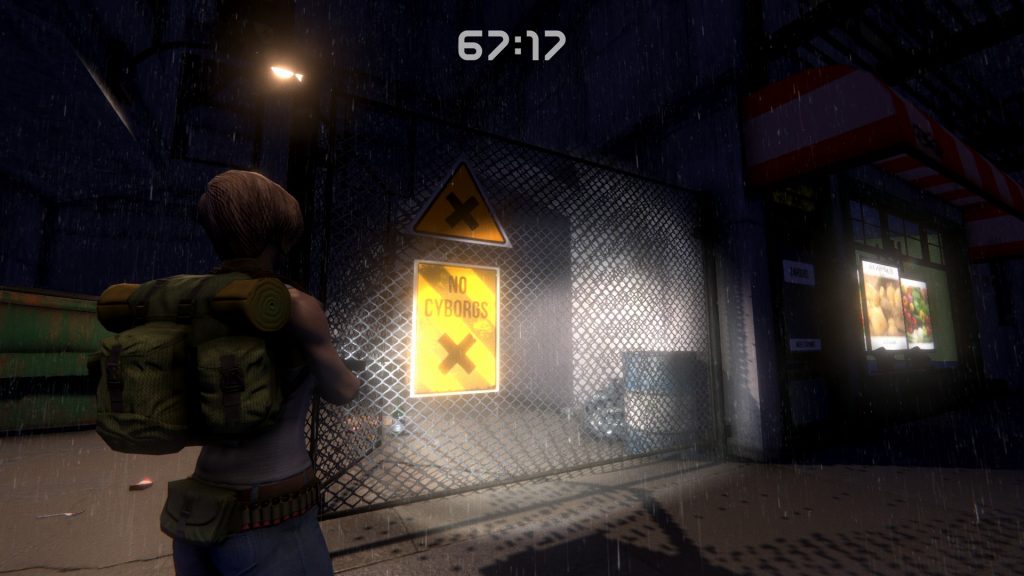Oh yeah???
January 22, 2020

[The game is Outbreak: Epidemic, In EA now and releasing soon for Linux, Windows, and XBox One!]
Old Androids Never Die, They Just Have A Few Screws Loose

So, gruesome but (maybe) amusing thought:
You know how back in gym class, if you didn't want to participate, it was easiest to get out of it by being really, really bad at the sport and getting your team angry at you by playing badly?
Wonder how well that would work at a gun range....
So here we have the GLUON robot arm kickstarter, which looked like a pretty damn cool toy at an amazing price. Of course, it was too good to be true, and yet another kickstarter ends up being ruined with no recourse and no explanation from anyone involved.
This officially puts my Kickstarter record at more disappointments than happy endings, so I'm done backing anything, I think.
Don't believe the nasty stereotypes about male gamers being pigs?
Try reading the chat during a woman's yoga stream on Twitch.
I was looking at anbox - a neat little program for running Android applications on Ubuntu - and was a bit unhappy to see that it was only supported on LTS releases, primarily because of kernel modules that aren't actually part of the snap package in which it's distributed. We're told that static images are supposed to fix dependency problems, and let you run programs built on one distro easily on another, but it's not quite the case, is it?
One of the nice side effects of having your application be part of a distro's package set is that it has to stay current to stay supported - that is, as the distro moves forward, your application must by necessity at least be rebuilt against new versions of dependencies. Static application images (like snaps, flatpack, and appimages) supposedly give the developer the luxury of not having to care about the underlying distro, and this is great - for them - if they can't, or won't, spend the time to keep their application up to date with the distros they support.
For users? Not so great, especially if the application has unspoken dependencies, like specific kernel or GPU driver features, or security problems.
Games are often one of the examples given in favor of statically packaged software, but they are also some of the most fragile software there is. A tiny variance between driver levels can turn into a major problem, either slowing the game to a crawl, or crashing it outright, and the developer - if they want to be responsible, of course - still has to test their game on all these variations, so much of the supposed benefit to static packaging is lost.
Security is another major problem, not only because it demands that the developer constantly update their dependencies themselves, it also means that if the developer doesn't keep up, while your distro itself may be secure, your applications may not be, so that old, reliable end-to-end encryption app you've used for months (and hasn't been updated for that long) has a fat stack of CVEs sitting in it, and you have no way to mitigate them.
Some of the static packaging solutions talk about security sandboxes, but when that sandbox includes your personal data, after a security incident, it will come as little consolation that the OS went untouched.
Lastly, a large number of statically-packaged applications may be violating the LGPL by shipping un-modifiable versions of LGPL libraries. You have the right to rebuild and replace LGPL libraries with your own versions; if the application is contained in an unmodifiable static image, you've lost this right. Maybe you don't care that much, but when that one-shot dev stops maintaining an app you depend on, lack of access and rebuildability will hurt.
Ultimately, I feel that the supposed benefits of static packaging are very underwhelming relative to the serious drawbacks they still have.
Moved CC up to the latest Ubuntu and WordPress. Let me know if anything's acting funny.
So, if you're wondering if Shenmue III runs on Linux, the answer is yes.
I see.
Installation is about as basic as it gets: fire up Lutris, pick the Epic Games Store installer, install and run that, then install and run Shenmue 3 from the launcher.
That's it. That's all. It just works.
Likely on Proton it will require the mfplat installer workaround, but hey, we've got a whole year before that's something that needs doing.
The screenshots below are all from Ubuntu 19.10 running the latest Lutris, using DXVK 1.4.4, on my ASUS gaming laptop with a GTX980M GPU.
This game is unreasonably cute.
So far it seems like a fairly simple, straightforward puzzle(ish) game, no idea if there are any platforming aspects to it but so far the gameplay seems to revolve around exploration, collection of patterns and materials for customizing Stuffie, and using abilities gained from the patterns to progress.
Runs good on Ubuntu!
Should be in the regular archives soon; in the meantime, you can install the mutter kit from proposed and get the fixes that way too.
I'm glad this one got fixed relatively fast, it wasn't just games that were affected. Firefox would hang, and take the desktop out with it. >:(
Because of COURSE they are. Apple has never been about openness for their users - despite how heavily their OSes rely on open-source software to make them actually work - they'd obviously prefer you become dependent on an app that runs only on their GUI.
Things like web pages make it relatively easy to write multiplatform software, and everyone knows that lock-in and lock-down are the way to make the big bucks. It's not a walled garden. It's a jail.
The company has made it extremely difficult to use web-based technology on its platforms, and it hopes developers won't bother
Source: Apple Is Trying to Kill Web Technology - OneZero